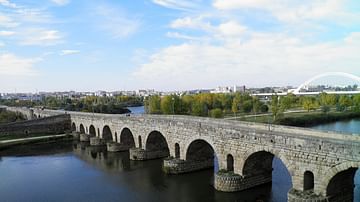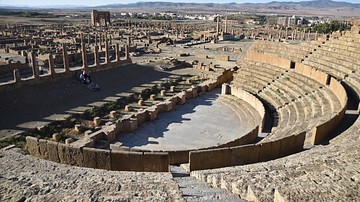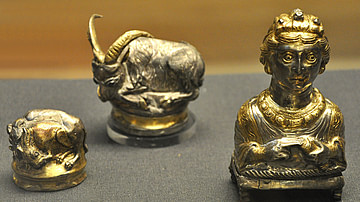Search
Did you mean: Antigone?
Search Results

Collection
Plagues in History
Plagues have swept through humanity ever since communities have gathered together in concentrated groups. In this collection of resources, we look at just some of the pandemics that raged throughout Antiquity and the Middle Ages, from the...

Video
Doctors, Diseases and Deities: Epidemic Crises and Medicine in Ancient Rome
In this lecture presented at The Explorers Club in New York, BAS Director of Educational Programs Sarah Yeomans examines a recently excavated, as-yet unpublished archaeological site that has substantially contributed to our understanding...

Video
Plague in the Ancient and Medieval World
The word 'plague', in defining a lethal epidemic, was coined by the physician Galen (l. 130-210 CE) who lived through the Antonine Plague (165 - c. 180/190 CE) but the disease was recorded long before in relating the affliction of the Plague...

Article
Legacy of the Ancient Romans
The legacy of the ancient Romans – from both the time of the Roman Republic (509-27 BCE) and the time of the Roman Empire (27 BCE - 476 CE) – exerted a significant influence on succeeding cultures and is still felt around the world in the...

Article
Top 10 Sights along Hadrian's Wall
The 1,900th anniversary of the visit of the Roman emperor Hadrian (r. 117-138 CE) to Britain and the construction of the wall that bears his name will be observed in 2022. A year-long festival will be held, filled with hundreds of events...

Article
Ancient Cyprus: A Travel Guide
Lying at the crossroads of the eastern Mediterranean, the island of Cyprus has long been a meeting point for many of the world's great civilizations. Situated where Europe, Asia and Africa meet, its location shaped its history of bringing...

Article
The Splendours of Roman Algeria
Algeria, Africa's largest country, stretches from the Mediterranean coastline to the Saharan desert interior. The country has some of the finest and most diverse Roman sites, including Timgad and Djémila, both well-preserved and UNESCO-listed...

Article
A Visitor's Guide to Rome's Frontier in Germany
In the 2nd century CE, the Roman Empire stretched from Scotland in northern Europe to the deserts of southern Egypt, encompassing the entirety of the Mediterranean basin. Beyond that lay its borders. Where there was no natural frontier such...

Article
The Roman Hoxne Hoard
The Hoxne Hoard is the largest cache of late Roman gold found anywhere in the Roman Empire. Discovered by a metal detectorist in Suffolk, in the east of England in 1992 CE, the incredible collection contains 14,865 late-4th and early-5th...

Article
Marcus Aurelius: Philosopher Emperor or Philosopher-King?
Co-authored by Steven Umbrello and Tina Forsee It is very common to hear in both academic circles, as well as more close-knit Stoic circles, Marcus Aurelius (121 – 180 CE) being referred to as the philosopher king. This is not an idea...